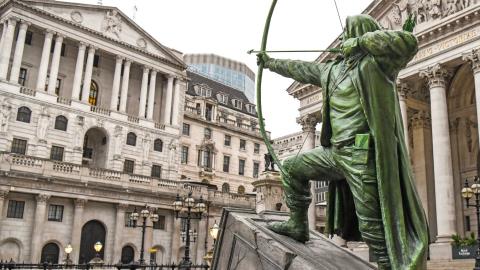Stock market investment app Robinhood has launched in the UK, commemorated by the installation of an eight-foot-tall statue of Robin Hood, aimed at the Bank of England.
The firm established a waitlist for UK residents in November, planning to gradually roll out the app over the ensuing weeks. Robinhood had previously postponed its UK debut in 2020 due to operational challenges stemming from a surge in day trading during the Covid-19 pandemic. A renewed commitment to the UK market was evident in July when Jordan Sinclair, formerly of Freetrade, was appointed to lead the UK operation.
“We’ve been actively gathering feedback and engaging with customers since our waitlist launch at the end of last year, and we’ve been encouraged by the positive response so far,” stated Sinclair. “Today’s general availability marks the start of a new chapter for Robinhood, and we’re eager to continue challenging the status quo by offering local products and services that resonate with our customers and meet their needs.”
At launch, Robinhood will feature trading without foreign exchange fees, trading outside of market hours, and no account minimums. Users can build a portfolio with as little as $1 and enjoy an appealing interest rate of 5% AER on their uninvested cash.
Robinhood is entering a competitive European market in its first global expansion beyond the US, facing established local competitors like Freetrade, as well as platforms such as Trade Republic, Scalable Capital, Lightyear, and Bux.
To incentivize users, the company is providing fractional share rewards ranging from $7 to $175 for referrals of friends and family.
However, Robinhood has faced challenges in the current tech downturn, resulting in successive layoffs amid declining trading volumes.
In November, Google’s parent company, Alphabet, dissolved its stake in Robinhood, after initially investing in the startup prior to its public offering in 2021, drawn by the surge in retail investing.
Robinhood went public at $38 per share and peaked at over $80 shortly after its debut. However, by the time of Alphabet’s stake dissolution, the stock was trading just above $8, having missed third quarter revenue forecasts, with both transaction revenue and monthly active user numbers declining.
